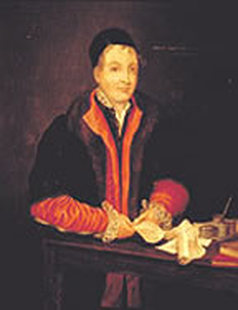Hector Boece (1465-1536)

Hector Boece (alternatively spelt Boyce or Boethius) was born in Dundee and educated at Scotland’s first, relatively new, University of St Andrews. Like many of his contemporaries, he proceeded to the University of Paris where he met Erasmus, with whom he became close friends. After a time Boece became Secretary to the Master of Collège de Montaigu, Jan Standonck, and by 1497 he had become a professor of philosophy at the university.
Three years later, in 1500, he left Paris for Aberdeen to become first Principal of the University of Aberdeen, newly established under the authority of a Papal bull issued by Pope Alexander VI at the request of. James IV of Scotland. The new university was the initiative of William Elphinstone, Bishop of Aberdeen, and Boece worked with Elphinstone, who had recruited him, to make it a reality. King’s College Aberdeen was modelled on Paris and Orléans, and by 1505 regular lectures were taking place there. Boece was installed as the first principal and the establishment included a teacher of philosophy, a position continuous with the Regius Chair of Moral Philosophy which still exists. Though a philosopher by training, Boece himself gave lectures on divinity and, somewhat unusually, medicine.
Apart from his work on creating Scotland’s third medieval university, Boece wrote and published two books. In 1522 he published the Vitae Episcoporum Murthlacensium et Aberdonensium (Lives of the Bishops of Murthlack and Aberdeen). In 1527 he published the book for which he was became known, his Historia Gentis Scotorum (History of the Scottish People), only the second scholarly history of the Scots to be written, the first having been written by John Mair of St Andrews.
Being written in a flowing and comparatively easy style, Boece’s History was well received became very popular, especially in Europe after its translation from Latin into French, and in Scotland after its translation into Scots. By modern standards it is partisan and inaccurate in many respects. Its account of Macbeth of Scotland flattered the ancestors of James IV of and maligned the real Macbeth, for example. Nevertheless, it was Boece’s version that Holinshed's incorporated into his Chronicle, thus formed the basis of Shakespeare’s famous play Macbeth.
At the end of 1534, Hector Boece became Rector of Fyvie in Aberdeenshire. He died in Aberdeen two years later at the age of 71.
Pre-Enlightenment Philosophers
- Duns Scotus (1265-1308)
- Hector Boece (1465-1536)
- John Mair (1465-1550)
- George Lokert (1485-1547)
- John Knox (1513-1572)
- Andrew Melville (1545-1622)
- James Dalrymple, 1st Viscount Stair (1619-1695)
- Hugh Binning (1627-1653)
- Henry Scougal (1650-1678)
- Lawrence of Lindores (?)